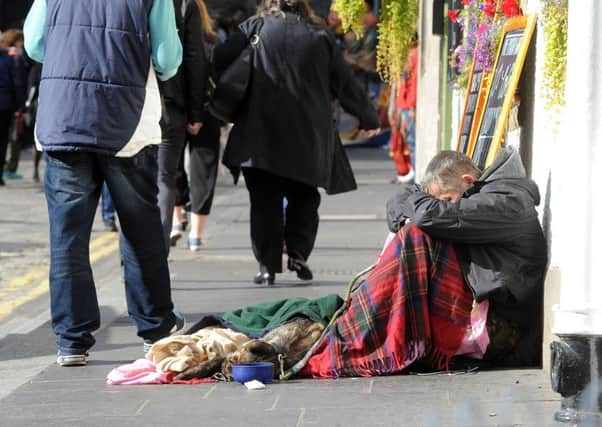General election: The life-and-death issue that’s virtually ignored – Martyn McLaughlin


With the trickle of election leaflets dropping through letterboxes quickly becoming a barrage, the tactics being employed by parties has not escaped the attention of ordinary voters.
Some candidates have chosen to include only minimal references to the party they are standing for, while many more devote the unsolicited correspondence to attacking their political rivals.
Advertisement
Hide AdAdvertisement
Hide AdBut perhaps what has most conspicuous by its absence is any attempt to set out policy pledges in black and white.
The leaflets are, almost without exception, devoted to constitutional affairs. These are issues of fundamental importance, but the contracting nature of political debate in Scotland and the UK means that issues just as crucial – indeed, ones that are a matter of life and death – are being overshadowed. There is no better example of this than homelessness. It is an escalating crisis which occupies the periphery of the campaign.
In 2018/19, 36,465 homeless applications were made across Scotland. That is the highest number in five years, and the second successive year the figure has crept upwards. Similarly, the number of households assessed as homeless by councils stood at 29,894 in 2018/19, the highest number since 2013/14 and part of a four-year-long increase.
Such vast figures, striking though they may be, blunt the sharper edges of the suffering. Every 18 minutes, a household in Scotland becomes homeless, and every day, the same plight befalls 38 children. That is not good enough. It cannot be good enough.
Yes, there has been a downward trend in the number of homeless applications and assessments in the decade since the recession tore families and communities apart.
Boris Johnson’s track record
This encouraging direction of travel was aided in large part by the local authority-wide Housing Options, which not only utilises private rented accommodation as well as council and housing association properties, but attempts to identify and provide support for people with underlying issues such as mental health conditions and crippling debt. Even so, the efficacy of such measures has proven limited. The trend, once again, is taking a turn for the worse.
The same miserable slew of statistics is evident at a UK level, where 319,837 people are now classed as homeless, a year-on-year rise of 12,607. And if, perhaps by dint of blunt head trauma, you expect Boris Johnson to be the very chap to solve this, consider for a moment his own record on the issue.
It is ten years since he railed against the scandal of people having to sleep on the streets of London. As that city’s mayor, he promised to end the indignity endured by the capital’s rough-sleeping population – which then numbered 3,673 – within three years.
Advertisement
Hide AdAdvertisement
Hide AdYou can probably guess what happened next. By the end of those three years, the number of rough sleepers had spiked by 60 per cent, and today it stands at 8,855.
Given his unique capacity for callousness and self-interest, Mr Johnson’s reasons for ignoring this shameful trend should be self-evident. Even so, it is simultaneously remarkable and predictable that such a crisis is not one of the most prominent issues in the general election campaign. The gaping maws of Brexit and #indyref2 devour all around them, of course, but it has been dispiriting to see so little in the way of substantive policy or debate over what is, and should be, a basic human right.
Labour’s £10bn pledge
The only party to have addressed the issue with any kind of prominence is Scottish Labour, which has pledged to invest £10 billion from a new UK-wide pot known as a National Transformation Fund to build 120,000 council and social homes in Scotland over the next decade.
Its promise to invest such significant sums is welcome and timely, given there are only 314,000 local authority homes in Scotland, and nearly half as many – a staggering 156,000 households – on waiting lists or transfer lists.
But even this headline figure is problematic, in that it fails to address the fact that funding decisions for housebuilding lies with the devolved administration. Then there is Labour’s claim that this money would end homelessness “once and for all”, an announcement that, at best, seems naive.
Bricks and mortar alone will not tackle the complex, underlying drivers of homelessness. Perhaps Labour know this, and simply take the view that structural reform is not a snazzy enough soundbite to generate headlines.
As any practitioner working in the social housing sector will attest, it is not soundbites that matter. It is hard-won legislative amendments, evidence-based approaches, and partnership working.
With the vast majority of the parties yet to publish their manifestos, there is a chance that such issues will form part of their campaign, but they will not be front and centre.
Advertisement
Hide AdAdvertisement
Hide AdThe question of the harm being caused by the primacy of constitutional politics in our national debate is one being asked before the nation goes to the polls, but it will remain valid in the weeks and months afterwards.
No one realistically expects the big ticket issues to be resolved any time soon, so Europe and the Union will continue to dominate. The repercussions of that are troubling, and do not bode well for the kind of rigorous, committed debate required to bring about lasting change.
